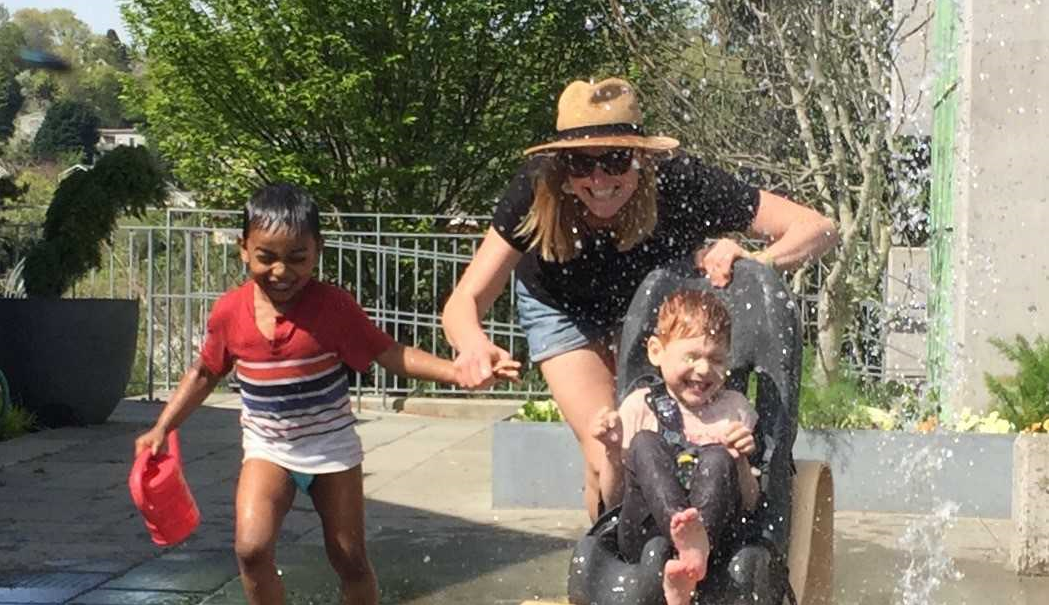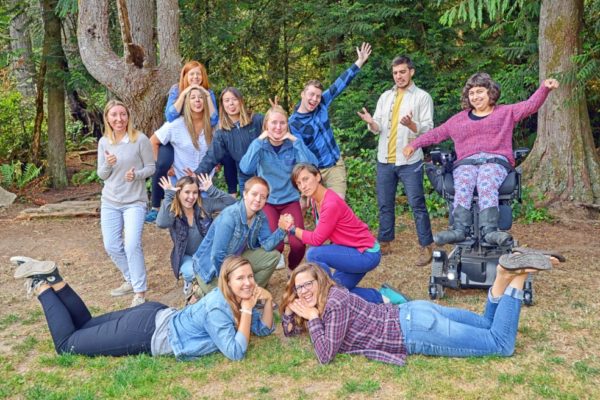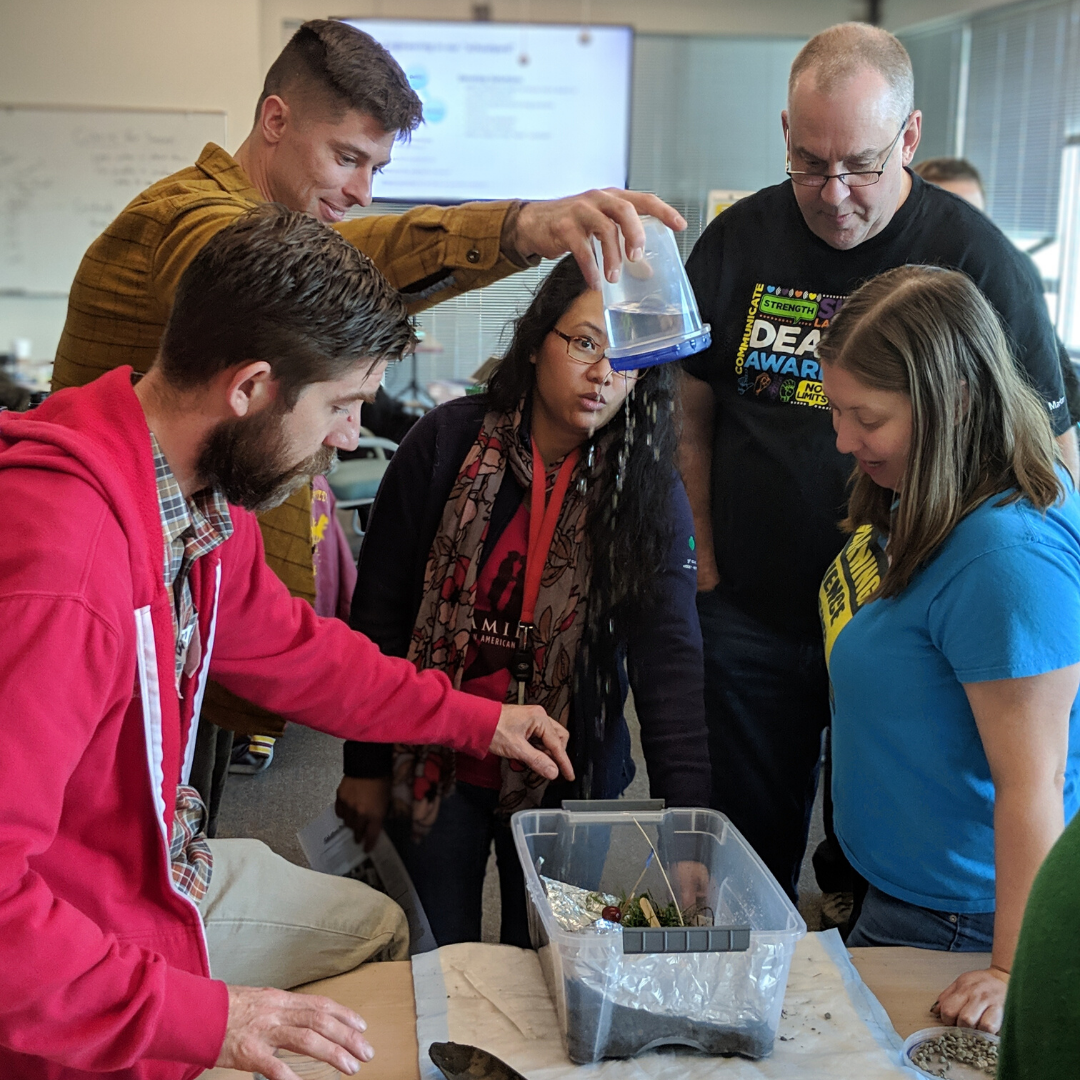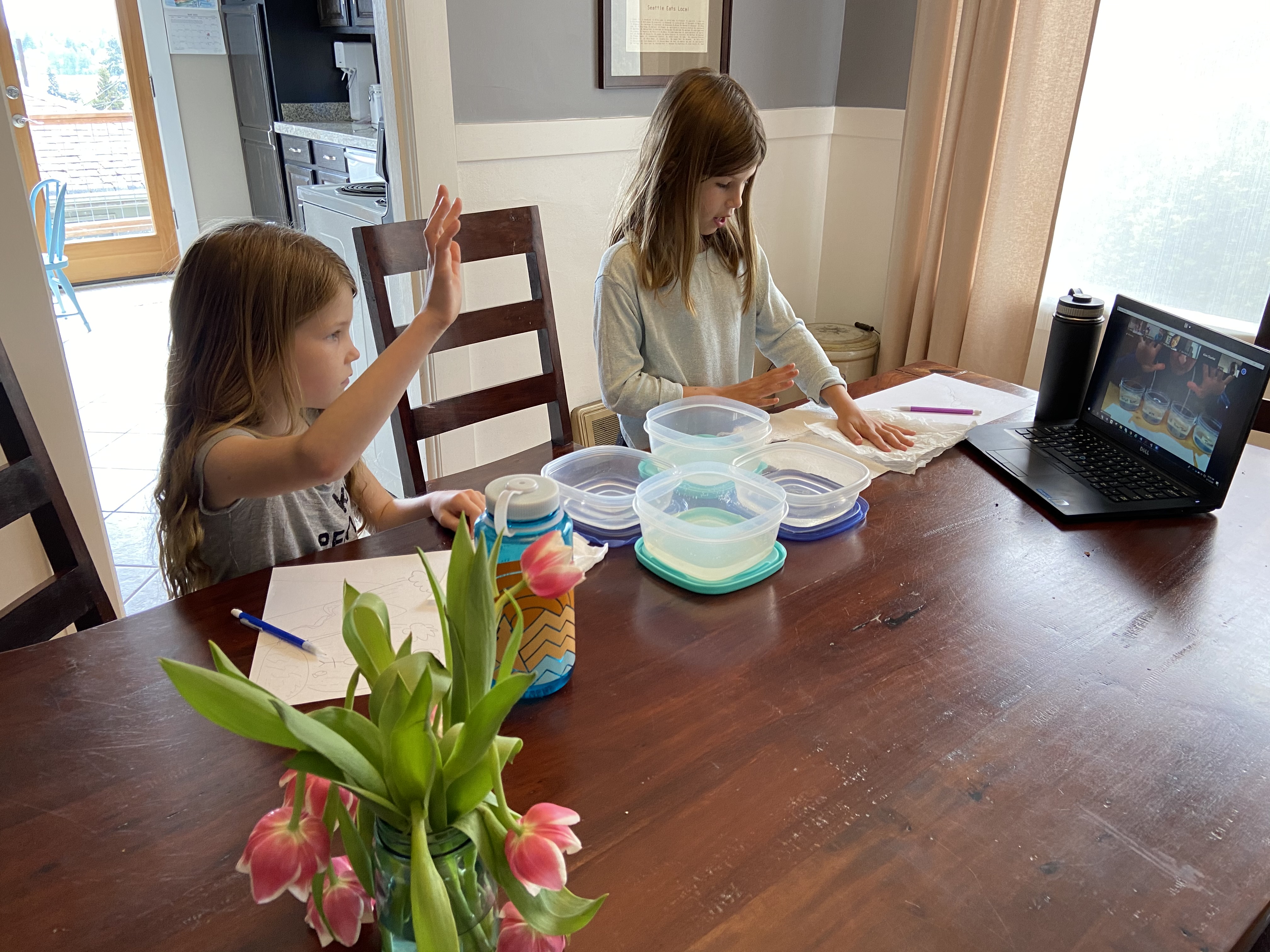On the South end of Bainbridge Island, just northeast of Blakely Harbor is a “School…
Author: Tamar Kupiec
IslandWood Graduate Program alum, Hannah Gallagher (’16), is the Inclusive Programs Director at the Seattle PlayGarden, a public garden offering open play, preschool, and summer camp for children with and without disabilities. It is a place where all children can take risks, overcome fears, and experience the joy and freedom of playing and learning outdoors.
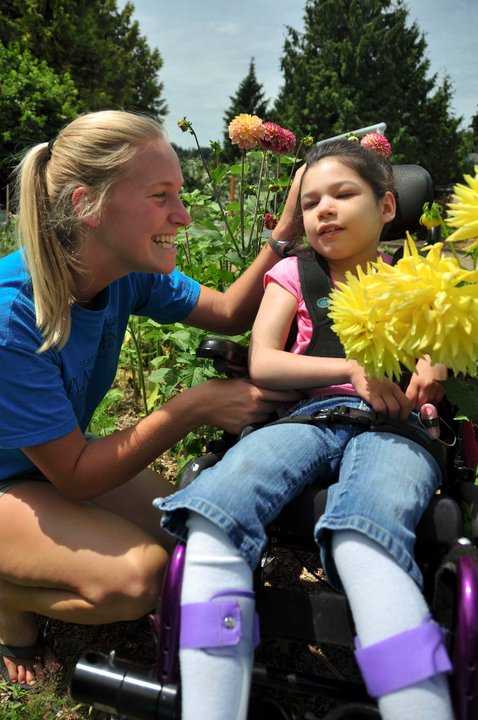
Hannah kneels next to one of her students.
The enchantments and opportunities are many. There is the wild zone with its switchback trails and a fort up in the trees where one can be a pirate or stage a show. Everywhere there are flowers, berries, and vegetables to tend and taste, even in an old red pickup whose engine has been replaced with a planter and whose flatbed now hosts a garden. And among the many accessible play structures, there is a commanding rubberized mound on which to slide down, scramble up, or simply circle about and enjoy its water feature.
Certainly, such a thoughtfully designed setting encourages children to engage with the natural world and with one another. But to achieve meaningful inclusion, it is not enough to simply place children with disabilities and their typically developing peers side by side in a park. It takes an educator like Hannah, who believes that connections between these children are possible and who has the skill and sensitivity to facilitate them.
“I strive to build a relationship with every child I teach. I consider each child’s unique strengths as well as their challenges. I work collaboratively with my colleagues to come up with creative approaches that allow me to better reach that child,” says Hannah. “My IslandWood experience helped me develop these skills. I want my teaching to help each child feel a true sense of belonging and sense of self. I want them to feel confident in their abilities and establish meaningful friendships.”
These relationships with her students enable her to find common ground between children who’ve often had very different life experiences. And her understanding of the systems that have segregated and stigmatized children with disabilities allows her to facilitate honest communication around these differences. She wants to break down notions that disability is inherently tragic or scary and to dispel the hero story. “Kids are kids first and foremost. They deserve and have a right to play.”
Hannah recalls with pleasure a time when she was able to facilitate such a connection between two of her students. Lucas, who uses a wheelchair and a tracheotomy, had aroused another child’s interest, prompting him to repeatedly approach, then dart away. “Julian,” Hannah said, “I notice you’re curious about Lucas. Lucas, can you tell Julian about your chair?” Lucas explained that he used his chair to help him get around and his trach to help him breath.” “How old are you, Julian?” Hannah continued. Julian and Lucas were both eight, and both, it turned out, loved Star Wars. For these boys, this was the basis of friendship.
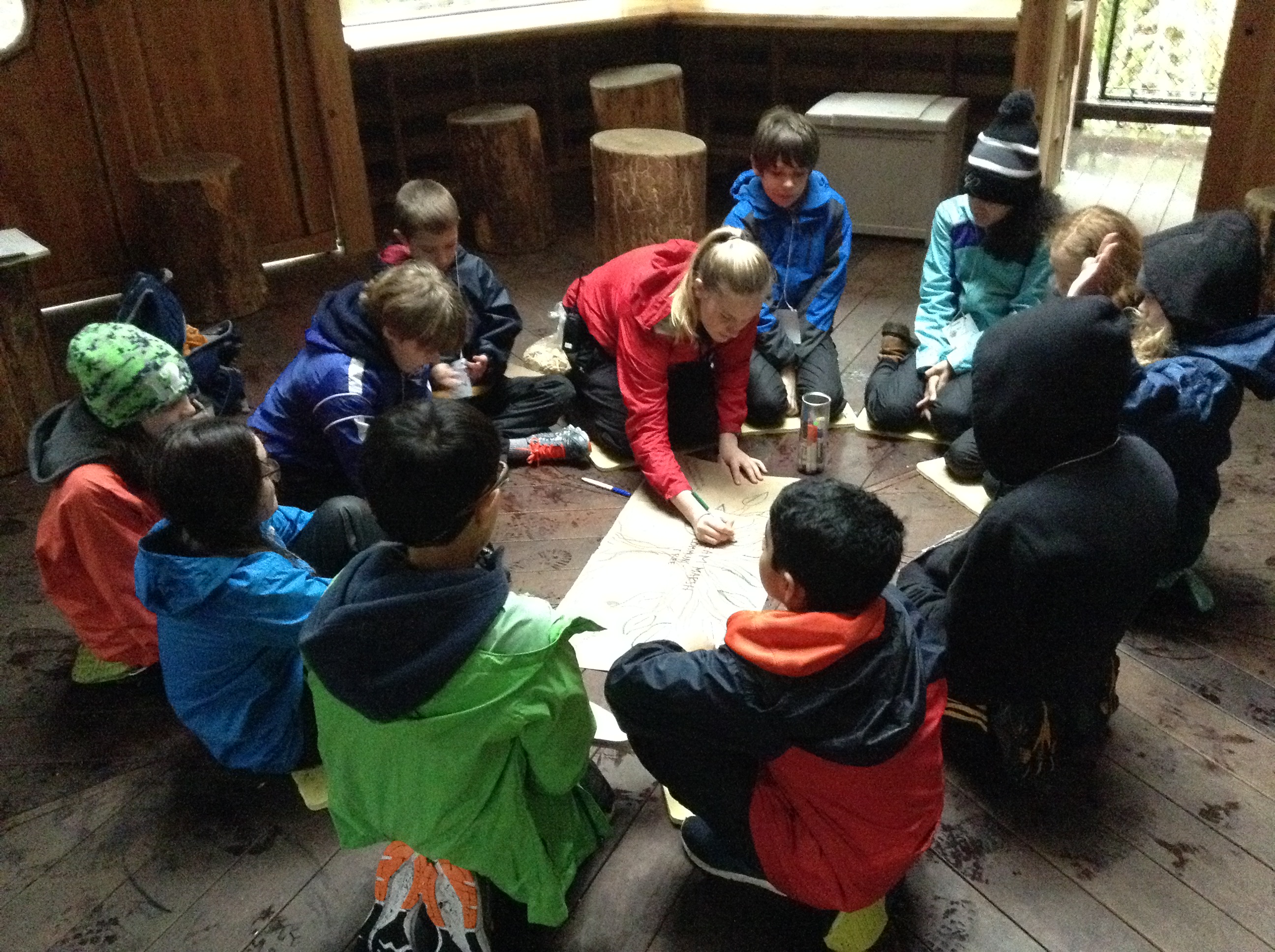
Hannah circles up with a group of School Overnight Program students during her time as an IslandWood graduate student.
Hannah is 28. She was still in high school when she started at the PlayGarden as a camp counselor. As much as she loved working with kids and being outside, she always assumed she would have to go out and get a so-called real job. In 2013, however, she attended the Natural Leaders Legacy Camp at IslandWood, where she met over 50 people who like her were working to increase equitable access to nature in their communities. As part of that experience, environmental education gained credibility as a field of study and a profession. In 2015, she returned to IslandWood as a graduate student and continued on to earn a master’s in education and a graduate certificate in nonprofit management from the University of Washington.
“The IslandWood experience changed my life. It shifted my perspective from thinking working with kids is fun to seeing my life’s work as an educator. I am also incredibly grateful for the community of people that IslandWood has connected me with. To this day, I rely on my cohort classmates, IslandWood faculty, and alumni for support.”
At IslandWood, Hannah learned to take things slow, to ask questions and let them sit unanswered. Teaching, it became increasingly clear, was not a matter of transferring content, but of building off students’ prior knowledge and guiding them toward discovery. Hannah also has a repertoire of activities and techniques that she learned at IslandWood. She uses “think, pair, share” and the “silent conversation” to make her camp counselors comfortable speaking out in a group. And once a month, her preschoolers follow the IslandWood tradition of Communi-tea. “What’s one thing you want to bring to the tea,” she’ll ask. Students contribute not only herbs and fruits, but also sentiments, such as kindness and courage.
With these and other new tools, her role at the PlayGarden has expanded. Today she is a lead preschool teacher, Summer Camp Director, and Inclusive Programs Director. In the latter role, she facilitates community education around inclusion. She has increased access to the garden through a program called Open Play and leads workshops based on the inclusion toolkit she and her colleagues developed, Say “Yes!” to Kids with Disabilities: Stories and Strategies for Including ALL Kids. Strategies can be as simple as tips for facilitating an inclusive circle time or as complex as rethinking an organization’s culture. The PlayGarden is now developing a series of introductory and advanced inclusion workshops for the community as well as site-specific trainings and workshops for organizations that like the PlayGarden are eager to make their programs more inclusive.
Hannah recognizes that the work of changing practices and attitudes is hard. “But the time is worth it,” she says, “and pays off in some of the most beautiful, inspiring, and humbling ways.”
Please note that this post was last updated on 5/20/2019. Some details, including job title or place of employment, may have changed since then.

